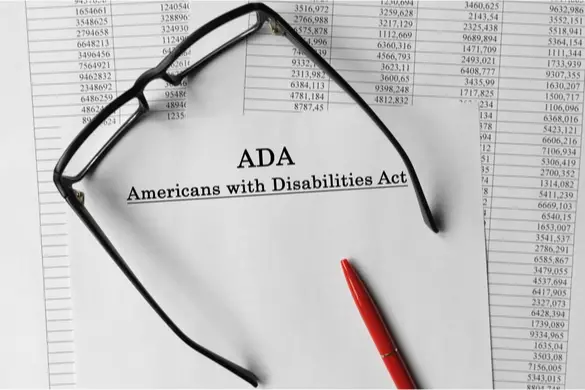
The ever-changing legal landscape surrounding the interpretations of the Americans With Disabilities Act has created a challenge for marketing managers wishing to maintain their website’s compliance. As courts continually make rulings and state and federal lawmakers issue new directives, the definitions of words like “accessible” are in flux. Keeping ahead of these changes will ensure that marketing managers avoid costly lawsuits and also maximize their audience by keeping their websites and digital marketing accessible. Here are 5 ways marketing managers can meet the legal standards for website accessibility.
The ADA’s Relevance To Websites
The original Americans With Disabilities Act, passed in 1990, does not specifically name websites in it’s original body, given that e-commerce and starting an online store was not a large part of public life at the time. While Title 4 of the Act references telecommunications, many recent lawsuits surrounding the ADA actually reference other aspects of the law. Because of a lack of concrete guidelines in the law itself, many judges are referencing informal standards like the Web Content Accessibility Guidelines. Despite the lack of specific language regarding websites, many courts have ruled that websites are subject to accommodation laws.
Websites As A Place Of Public Accommodation
Recent court rulings on the ADA have led to websites being defined as “A place of public accommodation” according to Title 3 of the law. What this means is that a website must make certain efforts to accommodate disabled users in the same way that a post office or hotel would. The statute defines what accommodations must be made as both to prevent discrimination while also being readily achievable. The size and resources at the business’ disposal are taken into account when defining what is readily achievable. Marketing managers should understand that many websites, especially larger ones, are being held to a similar accessibility standard as public buildings.
Strict Liabilities Laws
Since the ADA is defined as a strict liability law, ignorance of the law or even an ongoing effort to improve compliance is no excuse for not adhering to it. Digital marketing managers should understand that this means their websites should be built from the ground up to be accessible. Some physical businesses have been penalized under the ADA for failure to remove barriers to accessibility. Strict liability as a legal standard means that even in the absence of fault or criminal intent, businesses may be liable. Marketing managers should understand that a website or best advertising campaign has to actively adhere to the ADA standards.
Four Principles Of Accessible Content
As the Web Content Accessibility Guidelines are increasingly referenced by courts and lawmakers when defining an accessible website, marketing managers should understand the four main principles of those guidelines. A WCAG compliant website is perceivable, operable, understandable, and robust. Perceivable means that all elements of a website have an alternative equivalent presentation method that accommodates the deaf, hard of hearing, or blind. Operable means that all functionality of a website is available through a keyboard alone. Understandable means that navigating a website is a simple and logical process. Finally, robust means that a website is maximally compatible with current and future assistive technologies, such as text-to-speech programs. Marketing managers may realize that many of these guidelines are also best practices for digital marketing in general, so accessible content can be easy to implement.
Maintaining Compliance As The Legal Landscape Evolves
One principle that must be kept in mind by business owners and marketing managers is that legal obligations in this field are constantly evolving. As new court cases are resolved, the body of legal precedent expands the definition of both “disabled” and “accommodation”. For business owners, retaining a legal council to follow the outcomes of relevant court cases can provide a meaningful direction for future updates. New technological developments such as video email software also redefine what is meant by a reasonable accommodation. Business owners and managers should understand that strict liability means they have a duty to get out ahead of any new legal or technological developments.
As recently as September 2019, federal courts have continued to update and expand the Americans With Disabilities Act to include websites. While the ADA and the government lacks a set of specific guidelines for ADA compliance, it is still an important part of making a website. Modern websites are defined as “a place of public accommodation” meaning that they must adhere to certain accessibility standards like any other public building. Strict liability laws can mean that even well-meaning designers can be found at fault if they don’t do enough to meet compliance standards. With that said, compliance standards can be summarized in as little as four words; perceivable, operable, understandable, and robust. The evolving legal landscape requires managers who are willing to meet the accessibility challenge actively. For marketing managers, what makes a great website often intersects with keeping that website compliant with the ever evolving ADA accessibility standards.
 Business First Family Business, Accounting, Finance, Investing, Marketing And Management
Business First Family Business, Accounting, Finance, Investing, Marketing And Management